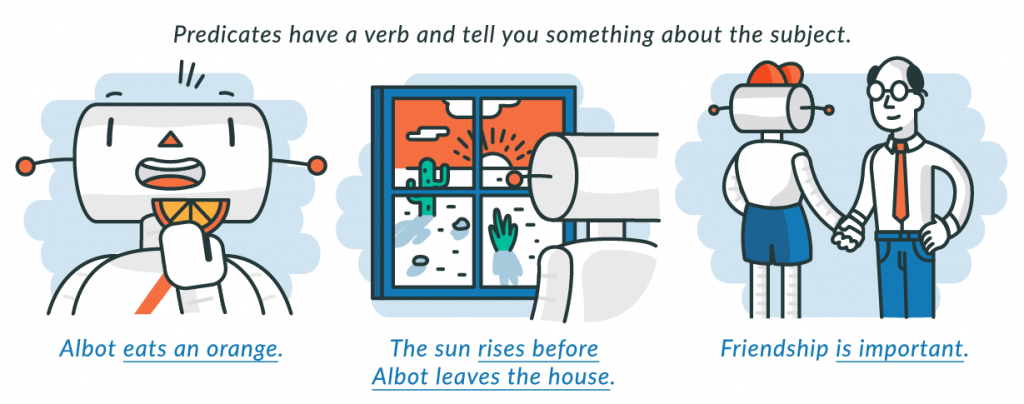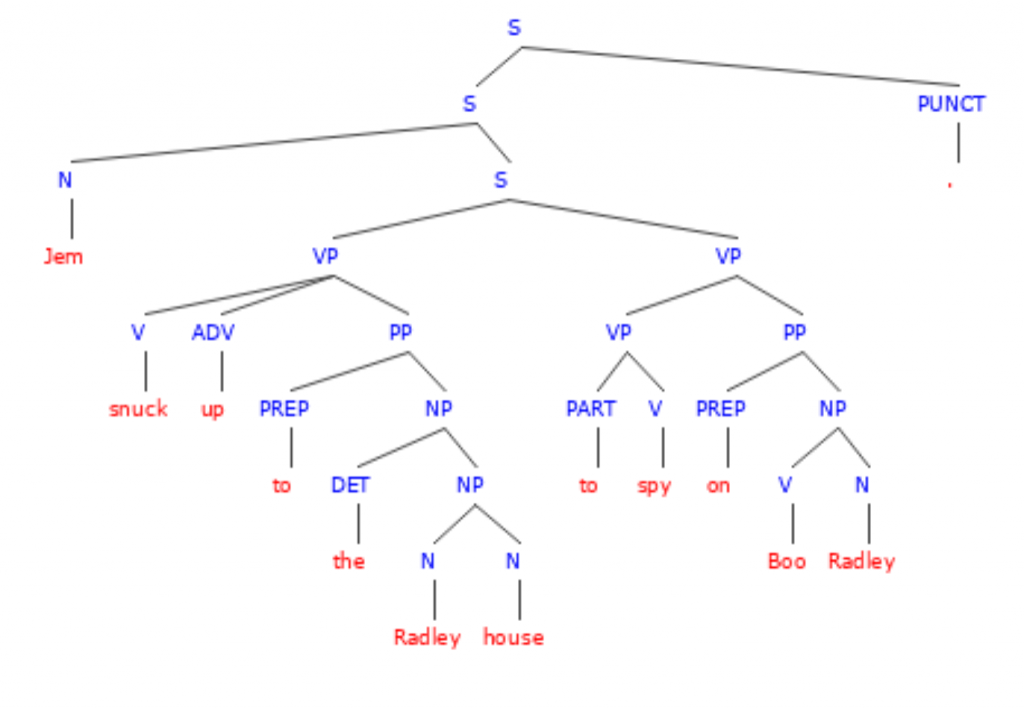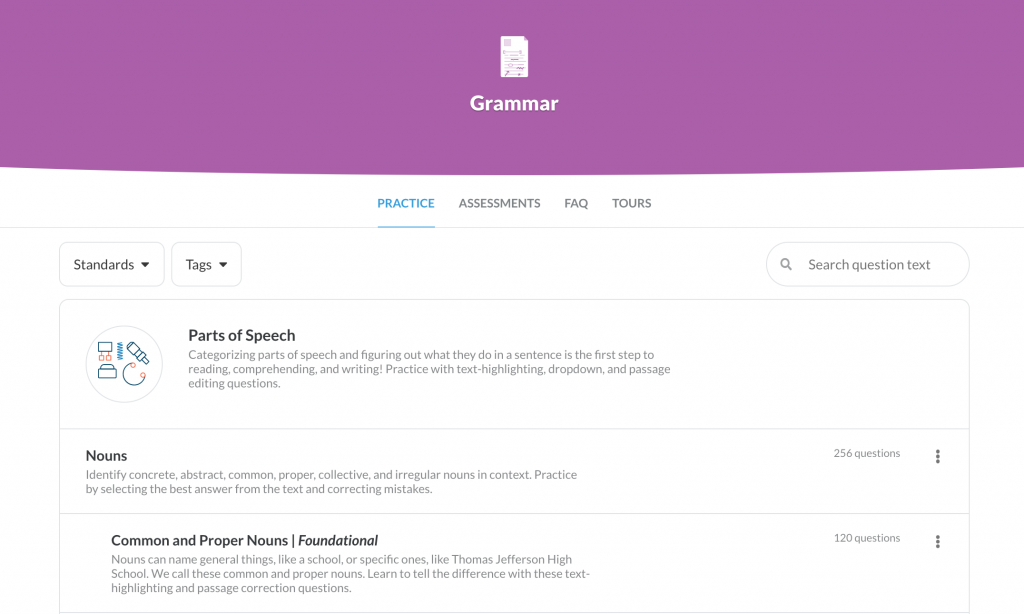Predicate definition: A predicate is a grammatical term that is part of a clause that includes the verb and the words that tell what the subject does. It is also called a complete predicate.
What are predicates? In its most basic form, a predicate is what the subject does. It contains the verb and any object or modifiers that are governed by the verb.
In the case of the example below, a predicate may be a single verb.
Subject and Predicate Example:
- Ivan jumped.
In this example, “Ivan” is the subject and “jumped” is the verb. “Jumped” is the predicate of the sentence.
A predicate may also include additional modifiers with the verb that tell what the subject does. This is called a complete predicate.
Predicate Example:
- Ivan jumped far.
In this example, “Ivan” is the subject and “jumped far” is the predicate. Here, far is an adverb to describe how Ivan jumped.
Additional Predicate Examples:
- Ivan jumped higher than Andrew.
In this example, “jumped higher than Andrew” is the predicate.
- Ivan read a book to the students.
In this example, the predicate of the sentence is “read a book to the students.”
Examples of Predicates in Sentences
Additional examples:
- Taryn laughed.
- Taryn laughed loudly.
- Taryn laughed loudly at the joke.
Each italicized phrase consists of the predicate. Each italicized phrase tells what the subject, “Taryn,” does.
Examples of Predicates in Clauses

Now, let’s look at a predicate in a dependent clause.
Example of Predicate in Dependent Clause:
- Because his bike was stolen, Rob had to buy a new one.
In the above example, two predicates exist.
The independent clause (the part of the sentence following the comma) contains the predicate: “had to buy a new one.” This is what Rob does.
The underlined portion of the sentence is a dependent clause. It contains the predicate “was stolen.” The subject here is “his bike.”
Different Types of Predicates
Simple Predicates

The simple predicate can be as simple as just one word. This one word will always be a verb.
- Sean spoke.
- Here, the predicate is a single word, the verb “spoke”.
Verb Phrase Predicates:
A simple predicate can also be a verb phrase, so long as there is no objects, modifiers, etc.
- Sean has spoken.
- Here, the simple predicate is two words and includes the verb phrase, “has spoken.”
Multi-word Predicates:
A predicate can also be more than one word. This will at least include a verb or verb phrase.
- Sean spoke at the convention.
- Here, the predicate is the verb “spoke” and the prepositional phrase “at the convention.”
- Sean has spoken at the convention.
- Here, the predicate is the verb phrase “has spoken” and the prepositional phrase “at the convention.”
Compound Predicates

Compound Predicate Examples:
Here are examples with the verbs “to speak” and “to present:”
- Sean spoke and presented. (more than one verb)
- Sean has spoken and presented. (more than one verb with verb phrase)
- Sean spoke and presented his project at the convention. (more than one verb and multi-word)
Predicate Adjective
What is a predicate adjective? A predicate adjective modifies the subject of a verb. A predicate adjective follows a linking verb.
Predicate Adjective Examples:
- John is happy.
In this example, “John” is the subject and “is” is the linking verb. “Happy” is an adjective that describes the subject “John” and follows the linking verb.
- Suzy is pretty.
In this example, “Suzy” is the subject and “is” is the linking verb. “Pretty” is an adjective that describes the subject “Suzy” and follows the linking verb.
Predicate Nominative

Predicate Nominative Examples:
- John is a leader.
In this example, “John” is the subject and “is” is the linking verb. “Leader” is a noun that renames the subject “John” and follows the linking verb.
- Sarah is an athlete.
In this example, “Sarah” is the subject and “is” is the linking verb. “Athlete” is a noun that renames the subject “Sarah” and follows the linking verb.
Summary: What is the Predicate of a Sentence?
Define predicate: The predicate is the part of a sentence or clause containing a verb and stating something about the subject. It includes the verb and anything modifying it. This is also called the complete predicate.
Example of a Predicate:
- We are ready to get food.
In this sentence, “are ready to get food” is the predicate.
There are also different kinds of predicates:
A simple predicate is the verb or verb phrase with its objects, modifiers, etc.
A compound predicate is a predicate with two or more verbs connected by and.
A predicate adjective modifies the subject of a sentence.
A predicate nominative is a predicate noun that completes a linking verb and renames the subject.
Contents
- 1 What is a Predicate?
- 2 Examples of Predicates in Sentences
- 3 Examples of Predicates in Clauses
- 4 Different Types of Predicates
- 5 Simple Predicates
- 6 Compound Predicates
- 7 Predicate Adjective
- 8 Predicate Nominative
- 9 Summary: What is the Predicate of a Sentence?
There are two essential building blocks in every sentence: the subject and the predicate. While the subject of the sentence is responsible for containing “who” or “what” is performing the action or experiencing a particular state in the sentence, the predicate is responsible for describing the action performed or state experienced by the subject. When joined together, subjects and predicates create a complete thought.
When you’re ready, test yourself with a quiz and practice with our high-quality, standards-aligned questions here.
The Basics of Predicates

What is a Predicate?
The predicate of a sentence describes either what the subject is doing or the state of the subject. The predicate must always contain a verb, but it can also include objects, either direct or indirect, and different types of modifiers, such as adverbs, prepositional phrases, or objects.
For example:
- The ballerina twirled gracefully across the stage.
In this sentence, the predicate begins with the verb, “twirled”, which describes what the subject is doing. The predicate also includes how and where the ballerina twirled: gracefully and across the stage.
What are the different types of predicates?
Predicates can be divided into two main categories: action and state of being.
Predicates that describe an action can be simple, compound, or complete.
A simple predicate is a verb or verb phrase without any modifiers or objects.
For example:
- Remy cooked.
A compound predicate is a combination of two or more verbs or verb phrases.
For example:
- Remy cooked and baked.
A complete predicate includes a verb or verb phrase with modifiers and/or objects.
For example:
- Remy cooked a delicious soup and baked a mouth-watering ratatouille for the food critic.
In this sentence, not only are there compound predicates, but there are also two direct objects and a prepositional phrase, making this a complete predicate.

Predicates that describe a state of being are labeled as predicate adjectives or predicate nominatives.
Predicate adjectives follow linking verbs to describe how the subject is feeling or how the subject appears.
For example:
- She was exhausted.
The linking verb, “was”, begins the predicate and is followed by a predicate adjective that describes how the subject is feeling.
Predicate nominatives also follow linking verbs, but these are used to rename or label the subject with another noun.
For example:
- She is the cheer captain.
In this sentence, the linking verb, “is”, begins the predicate and is followed by a predicate nominative, or noun, that renames the subject and is not considered a direct object.

How are predicates different from subjects?
While the predicate of a sentence describes an action or state of being, the subject lets the reader know who or what is doing the action or experiencing the state of being.
Usually, the subject appears before the predicate in a sentence, but this is not always the case! That is why it is very important to know the functions of both subjects and predicates to avoid confusion.
When predicates appear before subjects in sentences, it is usually an example of inverted syntax. Sometimes writers “invert,” or flip-flop, the normal flow of a sentence to draw attention to certain words.
Think Yoda-speak whenever you think about inverted syntax: For example:
- Patience you must have, my young padawan.

This sentence contains an example of a predicate adjective. “You” is the subject, and the verb phrase is “must have”, but since the predicate adjective appears out of place before the subject, the reader is forced to look twice.
Yoda speaks this way on purpose; he wants Luke Skywalker to pay attention to the most important word in the sentence, which is “patience”. When authors use inverted syntax, it is for this same reason.
Return to the Table of Contents
3 Tips for Understanding Predicates
Here are some important tips to help you understand Predicates:

Tip #1. Predicates always describe an action or a state of being
For example:
- In the abandoned mansion on the hill, I saw a flickering candle.
In this sentence, the complete predicate describes the action of the subject, “I”, and includes both an object and prepositional phrases acting as modifiers.
Here is another example:
- Upon seeing the light, I was terrified.
In this sentence, a predicate adjective is used along with a linking verb to describe how the subject feels.
Tip #2. Predicates are made up of the main verb and all of its objects and/or modifiers
For example:
- I silently approached the rotting doorway of the mansion and knocked.
In this sentence, there is a compound predicate that describes the two actions performed by the subject, “approached” and “knocked”, an adverb modifying the first verb, “silently”, as well as an object: “the rotting doorway of the mansion”.
Tip #3. The predicate does not always come after the subject of the sentence
For example, in one of Edgar Allan Poe’s most famous poems, “The Raven”, a line is repeated over and over:
“Quoth the Raven, ‘Nevermore’.”
In this sentence, Poe wants to emphasize that the Raven only ever says one word in response to the narrator’s endless questioning, which in turn drives the narrator into madness. Therefore, he places the predicate, “quoth” (which in Modern English means “said”) before the subject, “Raven” to emphasize the direct object or what the subject says over and over again.
Return to the Table of Contents
Applying the Basics: Predicate Review & Practice
Now that you understand how predicates function in sentences, review the anchor chart below and complete the review to fully understand how to use and recognize predicates.
The Ultimate List of Predicates
Refer to the graphic below to learn the different types of Predicates:

This list, obviously, does not include all possible predicates; however, it is meant to be used as a guide while differentiating predicates from subjects.
Predicate Exercises and Review
Now that you know some common predicates, test your ability to find these in the context of sentences.
Select the predicate in the sentences below. Remember, predicates describe an action performed by the subject or a state of being experienced by the subject and include all modifiers and objects.

1. Jem snuck up to the Radley house to spy on Boo Radley.
In this sentence, the predicate begins with the verb, “snuck”, and includes several modifiers including the adverb, “up”, two prepositional phrases, “to the Radley house” and “on Boo Radley”, and one infinitive phrase, “to spy”.
2. Scout hated school because she was always in trouble.
In this sentence, there are two clauses with two subjects and two predicates. The first predicate is “hated school”, and the second predicate is “was always in trouble”.
3. Calpurnia brought Jem and Scout to church.
In this sentence, brought Jem and Scout to church is the predicate because it starts with the action verb, “brought” and includes two direct objects and a prepositional phrase acting as a modifier.
4. Atticus decided to defend Tom Robinson in court.
In this sentence, decided to defend Tom Robinson in court is the predicate because it begins with the action verb, “decided” and includes both a direct and indirect object and a prepositional phrase acting as a modifier.
5. The Ewell family was notorious for skipping school.
In this sentence, was notorious for skipping school is the predicate because it contains a linking verb, a predicate adjective, and a prepositional phrase acting as a modifier.
Pro tip: When separating subjects from predicates in sentences, remember that the predicate always describes either an action performed or a state of being experienced. Predicates must always contain a verb.
For additional practice, check out Predicates content on Albert.
Return to the Table of Contents
Try for Yourself: Predicates Quiz

Feeling confident in your understanding of Predicates?
Take this short six-question quiz to see what you’ve learned:
1. True or False: The predicate consists only of the main verb.
- Answer: False
- Correct Explanation: That’s right! The predicate consists of the main verb and any objects or modifiers.
- Incorrect Explanation: Sorry, that’s not right! Remember, the predicate consists of the main verb and any objects or modifiers.
2. Are predicate nominatives used with action verbs or linking verbs?
- Answer: Linking Verbs
- Correct Explanation: That’s right! Predicate nominatives are used with linking verbs, and direct objects are used with action verbs.
- Incorrect Explanation: Sorry, that’s not right! Remember, predicate nominatives are used with linking verbs, and direct objects are used with action verbs.
3. In this sentence, is the word, “walking” a subject or a predicate?
Walking in the early morning is one of my favorite activities.
- Answer: Subject
- Correct Explanation: That’s right! Walking can be used as a verb or as a noun, but in this sentence, it is acting as the noun subject of the sentence while the predicate is
“Is one of my favorite activities”. We can find this out by asking what is the speaker’s favorite activity, and since the answer is walking, we know that this is the subject of the sentence and not the predicate. - Incorrect Explanation: Sorry, that’s not right! Remember, even though a word may look like a verb, it does not mean that it is automatically the predicate of the sentence. By asking the right questions, you can find the predicate with confidence.
4. In this sentence, is the word “content” a predicate adjective or an adverb?
He was content knowing that he did all that could be done.
- Answer: Predicate Adjective
- Correct Explanation: That’s right! The word content is a predicate adjective because it describes how the subject is feeling. It is not an adverb because an adverb would follow an action verb, not a linking verb.
- Incorrect Explanation: Sorry, that’s not right! Remember, a predicate adjective describes how the subject is feeling, while an adverb modifies an action verb.
5. In this sentence, is the predicate simple or compound?
The villain laughed maniacally and sped away in his Chevy Malibu.
- Answer: Compound
- Correct Explanation: That’s right! In this sentence, there are two verbs used to describe the action performed by the subject. Therefore, this sentence uses a compound predicate.
- Incorrect Explanation: Sorry, that’s not right! Remember, compound predicates use two or more verbs to describe the action performed by the subject.
6. In this sentence, is the predicate simple or complete?
We boarded the airplane with our bags over our shoulders.
- Answer: Complete
- Correct Explanation: That’s right! Since the predicate includes a main verb and an object and modifiers, it is complete instead of simple.
- Incorrect Explanation: Sorry, that’s not right! Remember, a complete predicate is made up of the main verb and objects and/or modifiers. A simple predicate only includes the main verb.
For additional practice with predicates, check out our predicates practice on Albert.
Return to the Table of Contents
Teacher’s Corner for Predicates
Since both subjects and predicates are the foundation for all other grammatical concepts, it is crucial that students have a firm understanding of both. The Common Core English Language Progressive Skills Chart is a helpful tool for teachers wanting to build on their students’ grammatical knowledge.
For specific standards on both subjects and predicates, check out the Common Core State Standards website.
Albert’s Predicate Practice provides a large bank of review questions to further embed understanding of predicates through regular practice. Albert also provides comprehensive assessments to gauge student retention of these concepts.
Summary for Predicates
Predicates are an essential part of every sentence, whether simple, compound, or complete. Predicates allow writers to bring their subjects to life through actions or a state of being, and the objects and modifiers within these predicates add even more details about the subject by supporting the main verb.
Be sure to check out our grammar course for more predicate practice.
You can also access over 3,400 high-quality questions that address nearly every grammatical concept.
Need help preparing for your Grammar exam?

Albert has hundreds of grammar practice questions with detailed explanations to help you master concepts.
In English grammar, a predicate is one of two main parts of a sentence or clause. (The other main part is the subject.) It is usually defined as a word group that comes after the subject to complete the meaning of the sentence or clause. The predicate is the portion of the sentence that contains the verb (or verb phrase); in very short, simple sentences, it might be only a verb.
The predicate tells what happened to the subject or what state it’s in. In the case of verbs that aren’t actions, those that describe states of being are called stative verbs. Examples include is or believe.
Key Takeaways: Predicates
- A clause has a subject and a predicate.
- To be a sentence (an independent clause), there must be a subject and a predicate, and it needs to be a complete thought.
- A simple predicate is a verb; a complete predicate is everything that’s not the subject.
Sentences Vs. Clauses
A sentence cannot be complete (independent) unless it has both a subject and a predicate; otherwise, a group of words is just a phrase or a clause. For example, a complete sentence could be, «Go!» It has both a subject («you», understood, is the subject, as the sentence is in the imperative voice) and a verb («go»). A complete sentence could also be something like, «Could you please go there?» (subject: you; predicate: could go over there please).
But something like «after he heard the news» or «who was the fastest runner» aren’t full sentences—they’re dependent clauses. These groups of words each have a verb (predicate) and subject, but aren’t a complete thought. (Though posed as a question, Who was the fastest runner? is a complete thought.)
Types of Predicates
A predicate may be many words or just a single word: the verb. In this first example, the verb laughed is the predicate of the sentence:
- Felix laughed.
A predicate may be a word group made up of a main verb and any helping verbs. In the next example, will sing is the predicate. Notice that the helping verb (will) comes before the main verb (sing).
- Winnie will sing.
A predicate may also be a complete verb phrase—that is, the main verb and all the words related to that verb except the subject. (This construction is called the complete predicate.) In this last example, the predicate is the verb phrase is always greener on the other side:
- The grass is always greener on the other side.
Depending on how detailed you need to get with your analysis of a sentence and its parts, you can also label compound predicates. A predicate is compound if one subject has more than one verb associated with it, joined with a conjunction. In this example, the subject Sandy has two predicates joined by and. She prefers to run first and then eat breakfast afterward.
- Sandy prefers to run first and then eat breakfast afterward.
Notice that this sentence doesn’t have two independent clauses. There is just one subject for both verbs. The words that follow the conjunction (and) do not make up an independent clause. Thus, there is no comma placed before and. (This is a very common mistake in writing. Watch for it.)
Whether it’s just one word or many words, the predicate usually follows the subject and tells us something about it.
Finding the Predicate
Finding predicates isn’t difficult; it just takes some examination of the sentence. You just have to understand who is doing what. First, find the subject and then the verb (or verbs). Anything that isn’t the subject of the sentence is the predicate.
- After the long hike up the mountain, the tour group rested and took in the views.
The tour group is the subject, the verbs are rested and took in, and everything but the subject is the predicate. Even though the dependent clause comes at the start of the sentence, it still tells something about when the group rested, making it an adverbial phrase. It’s not the subject of the sentence and thus belongs in the predicate.
If you are asked to find the simple predicate, it’s just the verb or verb plus a helper. If you are asked to find the complete predicate, it consists of all the words besides the subject.
Examples of Predicates
In each of the following sentences, the predicate is in italics.
- Time flies.
- We will try.
- The Johnsons have returned.
- Bobo has never driven before.
- We will try harder next time.
- Hummingbirds sing with their tail feathers.
- Pedro has not returned from the store.
- My brother flew a helicopter in Iraq.
- My mother took our dog to the vet for its shots.
- Our school cafeteria always smelled like stale cheese and dirty socks.
1. What is a Predicate?
Predicates are used every day, both in writing and speaking. However, we generally don’t think about them as we form our sentences. The predicate is the part of the sentence that contains the verb. Along with the subject, the predicate helps create a complete thought. It is the active part of the sentence, letting us know what the subject is doing.
Without the predicate, we would not know what is happening, so it is an essential part of the sentence. There are simple predicates, compound predicates, and complete predicates. To find the predicate, simply ask, “What is the subject doing?” Once you find the verb, you have found the predicate.
2. Examples of Predicates
Some examples of predicates are:
- When she got home, Amy found her toys scattered across the room. The predicate starts with the verb “found”
- My mom enjoys cooking and feeding us our favorite foods. The predicate starts with the first verb ”enjoys”
- The cat slept on the bed. The predicate starts with the verb “slept”
- Mark was happy with his gift. The predicate starts with the helping verb “was”
- At the party, Jose’s gift was the best. The predicate starts with the to-be verb “was”
3. Parts of a Predicate
a. Verb
A verb is a word that shows some kind of action, such as thinking, saying, doing, feeling, and being (see “to-be” verb below). Its function is to show what action the subject is committing. If there is no verb, then the predicate does not exist.
Some types of action include:
- thinking (worried, thinking)
- saying (exclaimed, says)
- doing (jumping, building)
- feeling (liking, hurting)
- being (is, are, were)
b. “to-be” verb
A “to-be” verb shows some state of existence. The subject may not be doing any specific action, simply the state of being. The “to-be” verbs are bold below.
Examples:
- The cat was sleepy
- I am
The “to-be” verb may also indicate a value or quality of the subject, such as
The book was an interesting but long story about relationships.
c. Object
Along with the verb, the predicate may contain the object if there is one. The object (in purple) is the item or person that is receiving the action (bold) done by the subject.
Examples:
- My cat played with the toy mouse.
- Mom roasted the turkey.
4. Types of Predicates
There are three basic types of a predicate: the simple predicate, the compound predicate, and complete predicate.
a. Simple predicate
The simple predicate is only the verb, not the modifiers that go with it. The verb will always be a part of the predicate, but there may be times that we only consider the verb itself, thus the simple predicate. We don’t notice the object, other ideas, concepts, or modifiers involved with the verb or the subject.
Example:
The boy was running.
The simple predicate would be was running. The helping verb “was” combined with the verb “running” make up the predicate.
Examples:
- Last night, two girls were singing at the talent show. Helping verb “were” and “singing” makes up the simple predicate.
- My mom is cooking our dinner. Helping verb “is” and verb “cooking” makes up the simple predicate.
- The book fell. The verb “fell” makes up the simple predicate.
- My family and I moved to Louisiana last month. The verb “moved” makes up the simple predicate.
b. Compound predicate
The word compound indicates a joining of two items, so a compound predicate would join two verbs with a conjunction. But the verbs should be done by the same subject, or, “share” the subject. A compound predicate is used when we want to make a sentence more interesting, add details, or convey additional ideas and concepts. It also helps to avoid repetition of the subject by combining actions into one sentence.
Example:
The boy was running around and jumping over all the obstacles.
The two verbs are was running and jumping, so the predicate would be was running around and jumping over all the obstacles. The subject is The boy. Other examples include:
Examples:
- Last month, my family and I moved to Louisiana and made new friends.
- Moved, made = verbs
- The book fell of the table and broke its spine.
- Fell, broke = verbs
- My mom is cooking but hates all the mess involved.
- Is cooking, hates = verbs
- Two girls were singing and dancing at the talent show.
- were singing, dancing = verbs
c. Complete predicate
The complete predicate will be the part of the sentence that contains the verb and all its modifiers (whereas the simple predicate is only the verb). The modifiers impact the verb and explain how the verb is affecting the object and/or subject.
Example:
My father became very angry when I came home late.
The verb is became. The adjective angry describes how his feeling changed or became; the adverb very is showing how angry he is, and when I came home late explains what caused the anger. The complete predicate is therefore: became very angry when I came home late. Other examples include:
- The tiger was pacing up and down in its cage while waiting for its dinner.
- My brother and I always race each other up the stairs at bedtime.
- When I get home, I fix dinner and relax in front of the TV.
- After getting lost, Susan decided to learn how to read maps.
5. How to Write a Predicate
a. Identify the time of the predicate
To write a simple predicate, you must first determine what action you want the subject to be doing. Once you know what type of action the subject will be taking, then write the sentence using past, present, or future tense, depending on the situation.
- Past tense would be something that happened before:
The boy talked to his mom.
- Present tense would be something that is happening now:
The boy is talking to his mom.
- Finally, future tense would be something that will happen later:
The boy will be talking to his mom when she gets home.
You must also be sure to have subject-verb agreement, which is ensuring that you are using singular verbs for single nouns and plural verbs for plural nouns.
- A singular verb would be:
The cat likes to sleep.
- A plural verb would be:
The cats like to sleep.
b. Identify the actions in a Compound Predicate
To write a compound predicate, you need to decide what two actions your subject is completing. Many times, we write two separate sentences, but because we need the subject in each, they sound repetitive. Combining the two thoughts into one sentence makes it more interesting and easier to follow.
Examples:
In the examples above, we combined two thoughts into one by adding the conjunctions “and” or “but.”
- Last month, my family and I moved to Louisiana. My family and I made new friend. = Last month, my family and I moved to Louisiana and made new friends.
- The book fell off the table. The book broke its spine. = The book fell of the table and broke its spine.
- My mom is cooking. My mom hates all the mess involved. = My mom is cooking but hates all the mess involved.
- Two girls were singing at the talent show. The girls were also dancing. = Two girls were singing and dancing at the talent show.
c. Predicate Must-haves
When writing a complete predicate, be sure to have:
- subject-verb agreement (singular verbs with single nouns; plural verbs with plural nouns)
- the correct tense, such as past, present, or future
- any prepositions, adverbs, objects, and any other modifiers to show what the subject is doing
- the two verbs joined with a conjunction
The predicate is the second principal part of the sentence which expresses an action, state, or a quality of a person or a thing denoted by the subject.
We distinguish simple and compound types of predicate.
PREDICATE:
simple verbal: He came there.
simple phraseological: She gave a cry.
compound nominal: I am 17.
compound modal: I can do it.
compound aspect: She stopped talking.
The simple verbal predicate is expressed by a verb in a simple or a compound tense form.
# Erick arrived early.
# I have been waiting for you for two hours.
There is a special type of predicate – the phraseological predicate. Here we use different phraseological constructions (to get rid of, to take care of, to pay attention to, to lose sight of, to have a smoke, to give a cry, to make fun of, to take part in, to change one’s mind, to get in touch, etc).
# The man gave a violent start.
# He was making fun of us.
The compound predicate consists of two parts: a finite verb and a predicative expressed by some other part of speech (a noun, a pronoun, an adjective, etc).
The compound nominal predicate consists of the link verb and the predicative (expressed by a noun, adjective, numeral).
# He grew more cheerful.
# He was a nice-looking fellow.
# The dance continued fast.
# She will make a good wife.
The compound verbal modal predicate may consist of a modal verb and an infinitive, modal expression, a verb with a modal meaning and a infinitive or gerund (can, may, must, to hope, to intend, to try, to want, to wish, to be able, to be obliged, to be willing, to be going, to be bound, to be anxious, to be capable, etc).
# You can prove everything.
# I have to work for my living.
# He wanted to throw himself into the whirlpool of Paris.
The compound verbal aspect predicate expresses the beginning, repetition, duration or ending of the action (to begin, to start, to go on, to finish, to keep on, to continue, to give up, etc). After the verb comes either infinitive or gerund.
# She began to study English.
# He kept speaking.
# It has stopped raining.
1. Read the following sentences. State the type of the predicate in each sentence:
1. Mary came rather late that morning.
2. She’s been working here for 20 years.
3. She used to be beautiful in her youth, but now she seemed rather weary.
4. Mark didn’t take any part in our work.
5. The British Isles were known as «Tin Islands».
6. He was looking through the window at the river.
7. I can tell at once what is going on.
8. She remained silent.
2. State the type of the predicate in each sentence:
1. He speaks English well.
2. He is speaking English now.
3. Do you know him?
4. He has invited me to his birthday party.
5. They will return tomorrow.
6. When Helen had gone, I returned to Rose.
7. «Well, what do you make of it?» – «I think, she’s telling the truth now,» said Rose decidedly.
8. The dog began to bark.
3. Translate the following sentences into English:
1. Я сегодня иду в библиотеку.
2. В нашем городе есть хороший парк.
3. На нашей улице не было магазина.
4. Ему следует быть более вежливым.
5. Ты выглядишь усталым.
6. Мой брат станет инженером.
7. Она вполне здорова.
8. Когда ты будешь свободен сегодня?
9. Мой отец против моего поступления в колледж этой осенью.
10. Что ты делаешь? – Я готовлюсь к урокам.
11. А можешь мне помочь?
12. Килограмм винограда, пожалуйста.
Данный текст является ознакомительным фрагментом.

